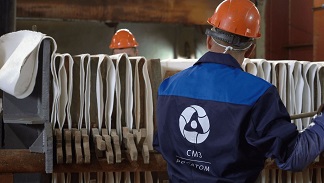Russia’s state-owned nuclear corporation Rosatom has been accelerating nuclear energy development in Africa, says the company, which joined the African Energy Week (AEW): Invest in African Energy conference – scheduled for November 4-8 – as a gold sponsor.
Currently, there is a surge in nuclear energy adoption in Africa, with projects targeting 15 GW of operational capacity by 2035, the Nuclear Business Platform estimates. Over 10 African countries are looking to embrace nuclear energy, the majority of which are leaning on global partnerships such as those fostered with Rosatom to accelerate project development. Rosatom’s return to AEW: Invest in African Energy reflects its growing intention to support projects in Africa.
“Rosatom represents a strong partner for Africa’s nuclear industry. The company is focused on supporting the construction of nuclear energy facilities while concurrently scaling up capacity building, mining activities and regulatory support. Nuclear has the potential to transform the continent’s power landscape and with partners like Rosatom, Africa is well positioned to tap into this growing market,” states NJ Ayuk, Executive Chairman of the African Energy Chamber.
It is indicated that Africa Energy Week sponsorship aligns with the corporation’s ambitions to strengthen its presence in Africa and follows a strong of deals forged with various African countries in the fields of nuclear power development, knowledge sharing and mining.
AEW: Invest in African Energy is the platform of choice for project operators, financiers, technology providers and government, and has emerged as the official place to sign deals in African energy. Visit for more information about this exciting event.
Rosatom signed an agreement with the Republic of Congo – which has ambitions to enhance the adoption of nuclear energy – in July 2024. The deal will see the parties collaborate on the peaceful utilization of nuclear energy and hydroelectric power. This aligns with the Republic of Congo’s efforts to diversify its energy mix beyond oil, leveraging Rosatom’s expertise to improve energy access.
The agreement followed the signing of an MoU with Guinea-Conakry in June 2024 to cooperate on the development of floating nuclear power plants. The corporation currently operates the world’s only floating co-generation nuclear power plant – Akademik Lomonosov – and aims to construct an additional 7 facilities worldwide. Suitable for remote regions with undeveloped or unreliable power grids, floating nuclear offers a range of benefits for African countries.
As a small nuclear power plant, the facilities provide access to clean and affordable power for hard-to-reach communities, offering an environmentally-friendly energy option with 24/7 operational capacity. The agreement with Guinea-Conakry will see Rosatom construct floating nuclear plants, equipped with RITM-200 reactors. Power will be used to support industrial and domestic consumption.
Rosatom also signed an agreement with Burkina Faso’s Ministry of Energy, Mines and Quarries for the construction of a nuclear power plant in the country. Construction will be complete by 2025 with the project expected to double Burkina Faso’s power production by 2030. The deal also features a clear roadmap to enhance the country’s nuclear power adoption, including the establishment of a regulatory framework for nuclear energy.
In addition to nuclear power development, Rosatom is driving nuclear energy capacity building and training across Africa. The company aims to utilize its expertise in the industry to support human capital development across the continent, with various programs in place to achieve this goal. In South Africa – the continent’s only nuclear power producer – Rosatom signed an agreement with the state-owned power utility Eskom for a nuclear action plan for the period 2024-2026.
The plan comprises joint education initiatives, joint degree programs and workforce training. South Africa plans to continue utilizing nuclear power to fulfil both its domestic and industrial needs. Recently, the Koeberg station – accounting for 5% of South Africa’s power supply – has been approved to run for an additional 20 years. The Rosatom-Eskom plans aims to support this by equipping the workforce with the requisite skills and capacities.
To support nuclear production in Africa, Rosatom is also advancing uranium mining across the continent. The company plans to start mining uranium in Namibia by 2029, with plans in place to complete the prospecting and exploration phase of the Wings Project by 2026. At a total investment of $500 million, the project will produce 5,000 metric tons of uranium per year.

